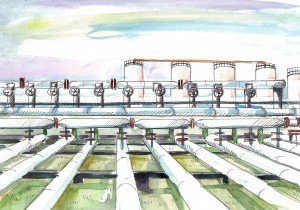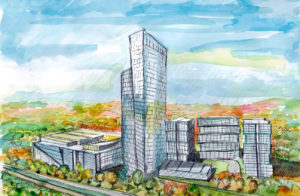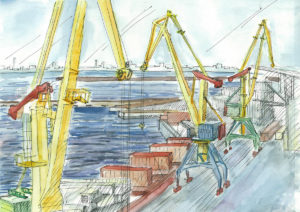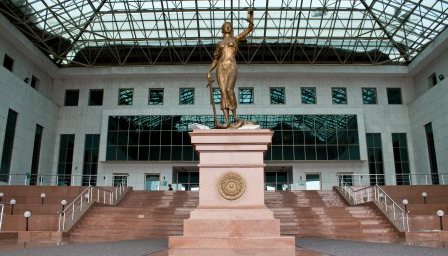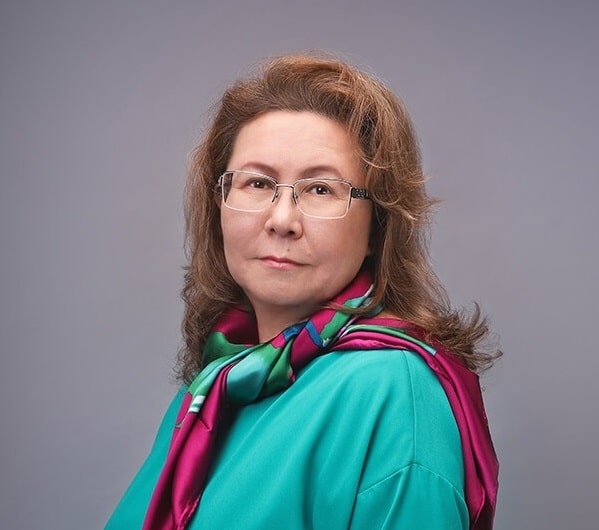- Gulnar Toktarkanovna, what is the current model of the judicial system in the Republic of Kazakhstan?
- Based on the provisions of the Constitution of the Republic of Kazakhstan, the judicial system is a branch of the government interacting with the other branches of the government – the legislative and executive ones by using the system of restrains and counterbalances.
According to the Constitutional Law of the Republic of Kazakhstan dated December 25, 2000 "On the Judicial System and the Status of Judges in the Republic of Kazakhstan" (further the "Constitutional Law"), the judicial power in the Republic of Kazakhstan is vested only to the courts in the person of the permanent judges and jurors engaged in consideration of criminal cases, in the cases and in a manner as prescribed by the law. The judiciary is intended to protect the rights, freedoms and legitimate interests of citizens and organizations, to enforce the compliance with the Constitution, laws and other regulatory legal acts and international treaties of the country. The judicial power is exercised through the civil, criminal, administrative or other statutory forms of proceedings.
The judicial system of the Republic of Kazakhstan consists of the Supreme Court of the Republic of Kazakhstan, local and other courts established under the Constitution of the Republic of Kazakhstan and the Constitutional Law.
The local courts include: 1) regional courts and courts equated to them (city court of the capital of the country, the city courts of the cities of national importance); 2) district courts and courts equated to them (city court, inter-district court).
Other courts may be created in the Republic of Kazakhstan, including specialized courts. For example, to date, specialized inter-district economic courts (SIDEC), administrative courts, military courts, juvenile courts, the financial court of Almaty authorized to consider civil disputes of the participants of the Regional Financial Center of Almaty, the specialized courts for consideration of criminal cases with the participation of the jury in the proceedings, with the jurisdiction over criminal cases of extremely grievous crimes. Moreover, a specialized inter-district military court for consideration of criminal cases was set up in the city of Almaty. The issues of introducing into practice of tax courts in the judicial system are being currently discussed.
The basic component of the judicial system of the Republic of Kazakhstan is the district (city) courts operating in every district or city that has no division into districts. As a court of first instance they consider almost all civil and criminal cases and cases on administrative violations, resolve issues related to execution of the sentence.
Regional courts are a key element of the judicial system of the country, where the vast majority of disputes finds its final resolution. Judicial boards are formed in the regional courts, and even specialized boards can be created. The bodies of the regional court are: 1) plenary meeting; 2) The appeal panel of judges in civil and administrative cases; 3) The appeal panel of judges in criminal cases; 4) Appellate judicial board.
The appeal panel of judges is headed by the Chairman, and the appeal judicial board by the Chairman of the regional court. Appointment to the relevant posts is carried out in accordance with the procedure established by the Constitutional Law.
Held in February 2012, the modernization of the judicial system strengthened the role of appellate judicial boards. Now in the appellate court the possibility of referring a case for a new trial in the courts of first instance is excluded. Thus, the Board of Appeals by recalling the wrong judgment or sentence takes up the case for consideration and renders a new judgment. Today, referring a criminal case for a new trial is possible only if the case has been considered with the participation of jurors. Much importance was given to the courts of cassation, which became the body revising under the complaints and protests the court orders that came into force (court rulings, verdicts of the courts of first instance and rulings of the courts of appellate). Court orders of the district and city courts can be revised by the supervisory judicial collegium of the Supreme Court only after the mandatory cassation proceedings. It should be noted that this requirement of the law applies to the appealing of civil cases accepted for the proceeding by the courts of first instance after July 1, 2012.
The Supreme Court is the highest judicial body for civil, criminal and other cases; it supervises the activities of the courts of lower instances. The Supreme Court examines precedents and court rulings. Upon its generalization, it considers the issues of compliance with the laws in the administration of justice by the courts of the country and gives elucidation on the issues of administration of justice through the making of regulatory decisions, which are included in the existing law and are commonly binding.
The cases in a supervisory proceeding are considered in the Supreme Court by the supervisory judicial board in civil and administrative cases, the supervisory judicial board in criminal cases, and in cases stipulated by law – the plenary session.
- And what about the material and technical base of the courts? - The funding of all courts is made from the republican budget. The Department to Ensure the Operation of the Courts at the Supreme Court of the Republic of Kazakhstan (the Supreme Court of the Republic of Kazakhstan) and its territorial units (Offices of the Courts) in the regions, the capital and the city of national importance deals with the organization and material and technical support of the courts, i.e. the creation of conditions for the administration of justice.
As the court employees noted and the parties to court proceedings could observe, the material/technical and financial support of the judicial proceedings has improved significantly in recent years. I was in the city court of Astana recently, and I was pleasantly surprised by the conditions created for the parties to a trial, who could wait for the call at the hearing, sitting in chairs in the lobby, and even watch movies on TV. Introduction in the activities of courts of an automated electronic document flow, audio and video recording of litigation, the installation in the courts of supervisory electronic recording, when the parties to the litigation can track via the Internet the movement of its court documents in the court; these are today’s positive achievements of the judicial system.
- Who decides what judge will hold a trial? How are the responsibilities for resolution of cases divided among the judges; what are the principles? - In contrast to the period of my work as a judge, currently, an electronic distribution of cases is operating in the courts of the Republic of Kazakhstan on the basis of the Integrated Automated Information and Analytical System (IAIAS). Such distribution of cases is carried out in all courts up to the Supreme Court. The specialization of judges is taken into account. As we know, the judges consider cases which are within the scope of their specialization. For example, in the specialized inter-district courts for criminal cases there are judges specializing in tax litigation. Accordingly, the distribution of cases of this category is carried out among these judges. Electronic distribution of cases in the courts was launched into operation to eliminate the influence of the human factor. It's difficult for me to judge how effectively it works.
- In what manner and in accordance with what requirements of the law shall the transcript of a court session be kept? What main aspects shall the transcript include? - The keeping of the transcript of a court session, which reflects the whole course of the court session for a specific civil or criminal case, is a prerequisite for the administration of justice. The transcript of a court session is kept by the court session secretary. The transcript of the court session is kept by using a computer, electronic means (including digital audio and video record), typewriting, or handwriting. Additional materials for recording a court session (transcript, audio and video material) are attached to the transcript of the court session and stored along with the other court documents.
We can say that the transcript is the guarantee of execution of the procedural rights by the parties to the court session, since the transcript reflects how fully and properly their procedural rights are complied with during the proceedings. Given the content of the transcript, the higher courts assess the legality and validity of the court order. The Civil Procedure Code and the Criminal Procedure Code regard the lack of the court session transcript as a material breach of the procedural law, entailing unconditional cancellation of the judgment, sentence, regardless of the arguments of the complaint or protest (Civil Procedure Code, Part 1, Art. 366, no item; Criminal Procedure Code, Article 415, Part 3, Item 10).
However, the transcript is not shorthand of the court session. It should reflect all significant aspects of the proceeding, thus the content of the transcript is strictly regulated by the laws. In accordance with the Civil Procedure Code, Article 256, Part 2, the following shall be specified in court session transcript:
- The date , place and time of the start and end of the court session;
- Name of the court considering the case;
- The full name of the judge and the court session secretary;
- Name of the case;
- Information on the use by the court of audio and video recording and/or shorthand;
- Information on the coming of the persons involved in the proceeding, representatives, witnesses, experts , specialists, and interpreters;
- Information elucidating the procedural rights and obligations for the persons involved in the proceeding;
- Orders of the presiding judge at the court session and the court orders rendered in the courtroom;
- Statements, applications and explanations of the persons and representative participating in the proceeding;
- Statements of the witnesses; the oral elucidation by experts of their findings; explanations of experts;
- Information on disclosure of documents; data on examination of physical evidence , listening to sound recordings and watching of video recordings;
- Information on the findings of the public agencies; the content of questions and answers that took place in the courtroom;
- The content of pleadings;
- The findings of the prosecutor; data on the disclosure of information and elucidation on the rulings and court order; clarification on the procedure for, and the period of, appeal;
- Data on explanation to the persons participating in the proceedings of their rights to examine the protocol and feed on it;
- Date of the court session transcript.
The making of the court session transcript had a more formal approach in recent years. In the court, the parties to the trial are requested to produce a statement of claim, statement of defense, and the statement in the debate on an electronic carrier (flash drive). Then these documents are compiled, together will all spelling errors as is, into the transcript, and the expert’s explanations duplicate the findings. Of course, such transcript does not reflect the real picture of the proceedings on the case: the statement of the parties to the proceedings, in addition to the content of the statement of claim and the statement of defense, the questions the parties to the proceedings ask each other and relevant answers, the examination of written evidence produced by the parties and the requests stated by them – all these are often not reflected in the transcript. Of course, in case of disagreement, a litigant is entitled to provide his/her own feedback on the transcript, but from my experience I will say that, as a rule, the judges reject the feedback.
Application of the means of audio and video recording of the trials can ensure the completeness and correctness of the trial transcript, but unfortunately, to date, not all courts have relevant devices.
- Will you tell us what is the tactics and strategy of litigation? - I will answer this question, based on my expertise in trials for civil cases. According to the Civil Procedure Code, Article 15, the parties choose what position in civil proceedings they will take; the ways and means of defending on their own, independently from the court and other bodies and persons. The court is completely exempt from gathering evidence on its own initiative to establish facts of the case. By virtue of the Civil Procedure Code, Article 65, each party shall prove the circumstances it refers to as the grounds for their claims and objections.
Thus, the outcome of the trial depends on the strategy and tactics of the trial chosen by the party. Legal representation in court involves a deep analysis of all the circumstances of the case. For this, it is necessary to examine all the documents, all the evidence, to question the concerned parties, etc. and from the variety of information produced to select that one which is important for the case. Then it is necessary to correctly interpret it. How well the statement of claim (if you represent the plaintiff) or the statement of defense (if you represent the interests of the defendant) are made, will affect, in many respects, the successful progress of the proceeding. A very important factor to win the trial is the correct strategy of the proceeding – how to oppose to the opposing party, how and at what point to ask the right questions, how to examine witnesses, experts, specialists, how to deal with procedural violations, and at what point to present evidence, at what point to start commenting on the evidence produced by the opposing party.
In the court of first instance, the plaintiff is entitled to modify the grounds for, or the subject of, the claim, to increase or decrease the amount claimed. The defendant has the right to file a counterclaim; the parties are entitled to submit petitions, including those demanding to produce additional evidence, to present their arguments on all issues arising in the course of litigation, to oppose the petitions and arguments of others participating in the proceedings. The parties may complete the proceeding by coming to an amicable agreement or settlement agreement through the mediation. The listed is the arsenal which the representative of a party can and must use, building the strategy and tactics of its behavior in the court. By exercising his/her procedural rights, the qualified lawyer will be even able to turn the losing situation in their favor and, on the contrary, the wrong tactics or strategy of the proceedings may spoil everything.
- Are there any specifics in conducting certain categories of civil cases, such as business disputes? - The specifics of consideration of cases on business disputes, ie disputes arising in business activities, lies in the fact that this kind of cases are within the jurisdiction of specialized inter-district economic courts, and the process of proving by the opposing sides of their rightness is based only on the documents. Moreover, along with the contracts, these shall be the primary accounting documents (invoices, bills, certificate of acceptance of work performed/services provided/goods delivered, powers of attorney, etc.). The specifics of prosecuting the case which refers to the category of business disputes are associated with the substantive laws which the opposing parties were guided by in their relationships, whether it was a supply, construction contract, insurance, government procurements or other.
It should be noted that on the majority of the types of cases, in order to apply the laws in a correct and uniform manner, the Supreme Court adopted normative resolutions, on the basis of which the parties to the proceeding and their representatives build their tactics and strategy of the proceedings on a particular category of cases.
Thus, according to the Regulatory Decree #5 of the Supreme Court of the Republic of Kazakhstan dated December 14, 2012 "On the application by courts of the laws on government procurements," in the consideration of claims for recognition of the suppliers, which have failed to perform or have performed improperly their obligations under the government procurement contracts concluded with them, so they are regarded as an unscrupulous party to government procurements, the courts should take into account the fault of the supplier as a basis of civil liability in accordance with the Civil Code, Article 359, and the negative consequences for the customer resulted from that, based on the criteria of fairness and reasonableness as per Item 6 of Article 6 of the Civil Procedure Code. Under the "negative consequences" it should be understood the considerable damage caused to a party to the contract, so that the party to the contract has largely lost what was entitled to expect in the contract (Civil Code, Article 401, Item 2). Thus, for example, for recognition under the suit of the state-run company (the plaintiff) of the supplier (the defendant) as an unscrupulous party to government procurements, the plaintiff must prove: - The fault of the defendant because of its failure to perform its obligations under the contract on public procurements; - Causing to the plaintiff such damage that the defendant has largely lost what was entitled to expect in the contract.
Therefore, defending the case on the side of the plaintiff, the evidence should be produced that the fault of the defendant was its failure to perform its obligations under the contract of government procurements and a considerable damage caused with this to the plaintiff. If you are the representative of the defendant, it is necessary, opposing the plaintiff, to prove otherwise.
One can also distinguish the specifics of conducting a court case, as provided for in the Civil Procedure Code, Chapter 27 ( Legal proceedings on the cases appealing against court decisions and actions (inaction) of state authorities, local authoroties , public associations, organizations, officials and civil servants), which lies in the fact that such cases arise from public relations and are considered as special proceedings, which provides for a shorter period for the applicants for filing an application to the court (within three months from the date when it became known to them of the violation of their rights, freedoms and legitimate interests), other rates of the state duty paid when filing the application, inability to use the mediation procedures.
This is specified in the Regulatory Decree #20 of the Supreme Court of December 24, 2010 "On Some Issues of Application by Courts of Provisions of the Civil Procedure Code of the Republic of Kazakhstan, Chapter 27." This is the procedure for appealing against court decisions, actions (inaction) of tax and customs bodies, their officers, bailiff, officials and local authorities etc.
- How does Kazakhstan combat with corruption? How severe the law is to the briber? - I, as any other citizen of Kazakhstan who reads newspapers, watches television, uses the Internet, know that the combat with bribery is underway in the country. I cannot judge how effective it is as I do not aware of that. But I think we are still far from the victory. Regarding the liability for this kind of crime, I can cite the provisions of Article 311 of the Criminal Code of the Republic of Kazakhstan, according to which the receipt by a person authorized to perform state duties as a public servant or by any other person equated to such, personally or through an intermediary, of a bribe in the form of cash, securities, other property, the title to the property or the property benefits in favor of himself/herself or other persons in exchange of the actions (inaction ) in favor of the briber or persons represented by him/her, if such actions (inaction) are part of official powers of such person authorized to perform state duties, or the person equated to such person, or such person due to his/her official powers can further such actions (inaction ), as well as on exchange of general protectorship or connivance in the execution of state duties, is punished by a fine in the amount equal to seven hundred monthly calculation indices (MCI) to two thousand monthly calculation indices, or by imprisonment for a period of to five years, or imprisonment for the same period, but with deprivation of the right to hold certain positions or engage in certain activities for a period of to five years with the seizure of property or without such (Part 1). The same action committed by the official, as well as the receipt of a bribe for illegal actions (inaction), is punished by imprisonment for a period of three to seven years with deprivation of the right to hold certain positions or engage in certain activities for a period of to seven years with the seizure of property (Part 2). Those actions which are specified in the first or second parts of this Article, committed by a person occupying a high official post, are punished by imprisonment for a period of five to ten years with deprivation of the right to occupy certain positions or engage in certain activities for a period of to seven years with the seizure of property (Part 3). Actions specified in in the Part 1, 2 or 3 of this Article, if committed: a) by extortion; b) by a group of persons in a prior collusion or by an organized group; c) as a bribery involving a large amount of money; g) repeatedly, - are punished by imprisonment for a period of seven to twelve years with the seizure of property (Part 4). Acts specified on Parts 1, 2, 3 and 4 of this article, if they are committed as a bribery involving a large amount of money, shall be punished by imprisonment for a period of ten to fifteen years with the seizure of property (Part 5).
With this, under the bribery involving a large amount of money, one should understand an amount of money, the value of securities, or other assets or property benefits, exceeding five MCI. Under the bribery involving a very large amount of money one should understand an amount of money, the value of securities, or other assets or property benefits that exceed two thousand MCI.
It is worth of noting that under the laws of Kazakhstan the bribery, as well as mediation in bribery, entails criminal liability.
- To date, the number of trials in the Republic of Kazakhstan has increased significantly that inevitably challenges before the future lawyers the need for a comprehensive and deeper knowledge of the law. What advice can you give to the graduates of the law schools? - I can recommend to students and graduates of law schools who are seriously thinking about their career to focus on the particular specialization, which is of most interest to them, and to build their career based on this specialization. Then there are much more chances to be in demand and to become a highly paid professional. The realities are such that the legal knowledge alone is not enough to get an interesting and high-paid job. Often the employers’ requirements to the candidate are the fluency in a foreign language, mostly English one. Speaking two foreign languages is welcome. If the graduate wants to devote himself to public service and hopes to succeed in that, then the speaking the state language is mandatory. The candidates, who apart from the education in the field of law have the knowledge of economics, are welcome. Therefore, after you were awarded a diploma from the college of law (faculty), do not stop on that and do engage in self-development, there are many ways for that now. In my opinion, we have the lack of proficiency and expertise in any area, whether it is courts, or any other public service, advocacy or work in a law firm, etc. I would like to wish you to be active, also if you participate in proceedings. The ancient Romans said: "The justice likes those who are active."
Interviewed by Galina Illarionova. Publicated in “Accountant and Law” magazine #10 (88), October 2013




